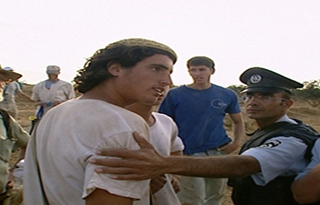Rabbis in Palestine
Can clerics, of all people, really help to resolve a conflict that is seen for the most part as rooted in religion?
 Arik Ascherman and Jeremy Milgrom are not your typical Israeli Rabbis. Every day, they leave their comfortable homes in Jerusalem to help Palestinians in the West Bank. As God's chosen people, they believe Jews have an obligation to challenge the injustices of Occupation. But few other Israelis agree. And - as well as confronting angry settlers - the Rabbis also have to dismantle the prejudices of most Palestinians. Can clerics, of all people, really help to resolve a conflict that is seen for the most part as rooted in religion?
Arik Ascherman and Jeremy Milgrom are not your typical Israeli Rabbis. Every day, they leave their comfortable homes in Jerusalem to help Palestinians in the West Bank. As God's chosen people, they believe Jews have an obligation to challenge the injustices of Occupation. But few other Israelis agree. And - as well as confronting angry settlers - the Rabbis also have to dismantle the prejudices of most Palestinians. Can clerics, of all people, really help to resolve a conflict that is seen for the most part as rooted in religion?
"These are not your trees! You are sinning in the name of God!" shouts an angry man in frustration. Rabbi Arik Ascherman is furious that settlers are allowing their goats to graze in a Palestinian olive grove. The settlers gather threatening so Arik calls for back up. Soon the police arrive. But instead of supporting the rabbi, they are overheard telling the settlers: "as soon as the activists are gone, we'll let you back in."
As an Israeli working in Palestine, Arik is constantly harassed by all sides. "I've been attacked by the army. I've been attacked by the settlers", he states. "Anyone who comes out here and thinks there are no dangers either has a death wish or is foolish." But while some Palestinians refuse to accept his help, he provides a lifeline to many others. "He comes to help us in this miserable situation. He gives us hope and courage", states farmer Jamal Uthman.
Since the start of the second intifada, life has become much harder for Palestinians. Freedom of movement is so restricted that economic development is impossible. Many farmers have not gathered their harvest for years. "People are living in shacks", laments Rabbi Jeremy Milgrom. "They've no electricity. They've lost their land to the expansion of Jewish communities."
The oppression and suffering they have witnessed in the West Bank has challenged the rabbis' religious faith. "A part of me thinks 'wouldn't this world be better without religions and nationalities?' But I believe God has a purpose for me as a Jew and is commanding me," states Ascherman. He considers himself a Zionist and during his work in the West Bank, consciously wears his Kippah so that he is identified as a Jew and can show the Palestinians another side of Judaism.
Arik's colleague, Jeremy, is even more provocative. This divorced father challenges the 'Two States Solution' and is campaigning for a binational, secular state. "I hope we will have a state for both people and that Palestinians and Jews will live in partnership." Unfortunately, in the Palestinian city of Azarya, Israelis and Palestinians are a long way from living together. Locals have been forced to move three times to make way for new Jewish settlements and now live next to a rubbish dump. "The air is poisoned. The children are constantly ill," despairs one man.
But the Rabbis' commitment to the Palestinians places strain on their family life. Jeremy is divorced and Arik rarely sees his children. His wife, Einat, often has to force him to stop working. "He has to realise that he can't save the entire world", states Einat.
Through their actions and beliefs, the Rabbis are challenging widespread prejudices. As Ascherman states: "We give Palestinians hope that there are other kinds of Israelis they can talk to, come to agree with and have peace with."
FULL SYNOPSIS
